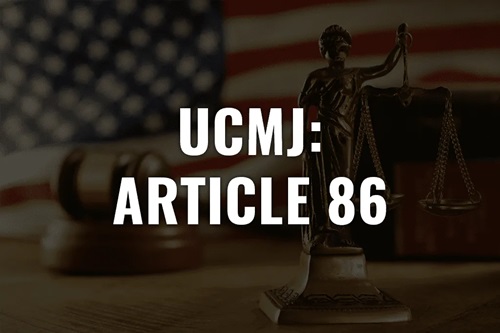What is Article 86 UCMJ?
Article 86 of the Uniform Code of Military Justice (UCMJ) deals with “Absence Without Leave” (AWOL), a serious offense in the U.S. military. This article applies to all service members who, without authority, fail to go to their appointed place of duty, leave that place, or are absent from their unit, organization, or duty station. Article 86 UCMJ is in place to maintain discipline and accountability within the armed forces, ensuring that all personnel fulfill their roles and responsibilities.
Types of Offenses Under Article 86 UCMJ
There are several ways a service member can violate Article 86 UCMJ:
- Failure to Go to Appointed Place of Duty: This refers to not reporting to a duty assignment, formation, or other official obligations at the designated time.
- Going from Appointed Place of Duty: This involves leaving a duty post or assigned position without proper authorization.
- Absence from Unit, Organization, or Place of Duty: When a service member is absent without permission for any period of time.
- AWOL for Over 30 Days: If a member is AWOL for more than 30 consecutive days, they may be considered a deserter, which carries more severe consequences.
Consequences of Violating Article 86 UCMJ
The penalties for violating Article 86 UCMJ depend on the nature and length of the absence. Potential consequences include:

- Nonjudicial Punishment (NJP): Often referred to as Article 15, this includes restrictions, forfeiture of pay, or extra duty.
- Court-Martial: For serious or repeated offenses, a service member may be subject to a summary, special, or general court-martial, leading to more severe punishments.
- Reduction in Rank: A common penalty that affects a service member’s career and pay grade.
- Confinement: Depending on the severity, jail time can be imposed, especially if the absence was long or caused significant disruption.
- Dishonorable or Bad Conduct Discharge: Extended or intentional AWOL cases may result in separation from the military with a stigmatizing discharge status.
Defending Against Article 86 UCMJ Charges
There are defenses that can be raised in response to charges under Article 86 UCMJ. For instance:
- Lack of Intent: If the absence was not willful or the service member misunderstood orders.
- Emergency Situations: Unforeseen personal or medical emergencies may be valid defenses.
- Improper Notification or Orders: If the accused never received proper notice of duty.
It’s essential for accused service members to seek legal counsel immediately. A military defense attorney can evaluate the facts, determine the best defense strategy, and represent the service member in legal proceedings.
Why Article 86 UCMJ Matters
The military depends on the reliability and presence of every member to operate effectively. Article 86 UCMJ is essential in upholding discipline, structure, and accountability. Unauthorized absences not only impact unit readiness but also erode trust among commanders and fellow service members.
Understanding the implications of Article 86 UCMJ is crucial for anyone serving in the armed forces. Whether you are a new recruit or a seasoned officer, staying informed and complying with military duties ensures mission success and personal career stability.
Conclusion
Violations under Article 86 UCMJ can have long-lasting impacts on a service member’s career and future. Promptly addressing accusations of AWOL with the help of a qualified military attorney is essential. Maintaining accountability and understanding the law is the first step in upholding military standards and protecting one’s rights within the armed forces.
